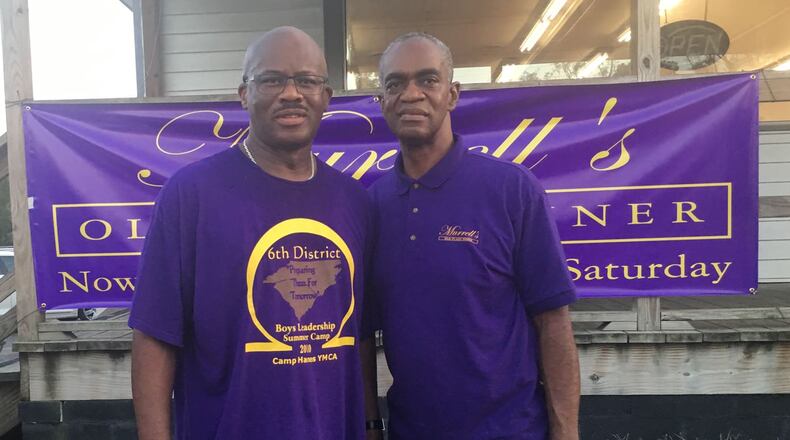Michael Murrell was a giver.
“He gave to a fault,” said his younger brother, Robert Murrell, who was also his partner in business. “If you had a need, he would help. He gave away food. He gave away money. He supported so many people and causes.”
The popular restaurateur died Tuesday at Emory Decatur Hospital from complications of COVID-19.
He was 65.
For years, Murrell owned and operated Murrell’s Cafe on the campus of the Interdenominational Theological Center. Before that, he had a restaurant, Murrell’s Scholars, at Morris Brown College.
He recently closed the ITC location to focus on restaurants in North Carolina and a new project in Atlanta at Omega Psi Phi International headquarters, said his brother.
One of his most passionate causes was historically black colleges and universities.
Related: COVID-19 changes how we grieve
He was the first in his family to attend college. He chose two HBCUs — Winston-Salem State University for an undergraduate degree in sociology and North Carolina A&T State University for a master’s degree in multimedia.
“He felt like black colleges were diamonds in the rough,” said Robert Murrell. “He felt we needed to support them.”
That extended from financial donations and giving food to students in need to even encouraging top-tier athletes to consider attending HBCUs.
“He would always talk to them and say, ‘You don’t have to go to Georgia Tech, you can go to North Carolina A&T. You can go to North Carolina Central.”
Michael Murrell was a native of Trenton, North Carolina, and the father of two adult daughters, Jessica Hope Murrell Berryman and Destinee Martin.
Murrell believed it was important for the community to work together. He encouraged people to form their own businesses.
He made a point to patronize black-owned banks, use black suppliers and hire promising young African Americans.
“My dad was larger than life,” said Murrell Berryman. “He enjoyed helping people. He planted a lot of seeds in people’s lives, whether it was words of encouragement or showing up to be supportive.”
Michael Murrell moved to Cleveland to work for a transportation company in 1978. While there, he started working for a family that ran a concession business.
Michael Murrell, though, was “a visionary,” said Robert Murrell. He bought one of the trailers and drove it to North Carolina, where he started Carolina Concessions.
“Before food trucks were cool, he had a food truck,” said Murrell Berryman. He worked the concessions at HBCUs and other universities in the region during games and special events.
Related: Hospital chaplain adjust to the new normal
The problem was “the sales were good, but Mike gave away a lot,” said Robert Murrell. “He’d come back broke. I used to get so mad at him. Then he would say, ‘Hey, man, let me borrow $700.’ That was just him.”
One day, Michael Murrell set his sights on selling concessions for the Carolina Panthers. He, his brother and their uncle did a presentation to then-owner Jerry Richardson.
“My brother promised that man all the stuff we could do,” Robert Murrell said.
At the time, they didn’t have the staff or products.
“Within two weeks, that billionaire sent us a check for half a million dollars.” They ended up with concessions for the Panthers training camp and, later, the stadium.
Michael Murrell moved to Atlanta in 2001 and opened a restaurant on Baker Street. Then he moved to the Atlanta University Center.
His restaurants “were set up as close as he could to five-star restaurants,” said the Rev. William E. Flippin Sr., senior pastor of Greater Piney Grove Baptist Church, which Murrell attended. “I’ve never seen anyone who was a harder worker and wanted things to be perfect.”
Michael Murrell was looking to the future.
In late March, however, he complained that he didn’t feel well. He had no energy or appetite.
Michael Murrell had underlying health issues.
Worried it could be COVID-19, Robert Murrell took him to the doctor.
Afterward, he dropped his brother off at his Stone Mountain condo and drove home. Soon, he got a call from the doctor to take his brother to the hospital.
When he returned, he found him passed out on the floor.
He spent 32 of 34 days on a ventilator.
Robert Murrell, wearing protective gear, got to visit his brother at the end, a rare thing during this pandemic.
On Friday, hundreds of friends and family sat in their cars in the parking lot of Greater Piney Grove Baptist Church in Atlanta, to say goodbye. Members of his beloved fraternity, Omega Psi Phi, released purple and gold balloons.
About the Author
The Latest
Featured



